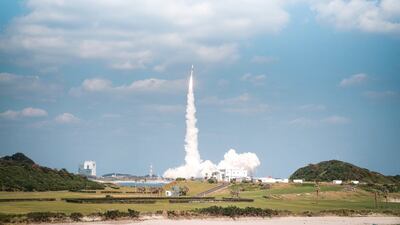The UAE plans to launch two small satellites each year that would host the latest technology built by private companies or university students.
Under the Payload Hosting Initiative (PHI), engineers at the Mohammed bin Rashid Space Centre (MBRSC) would construct the satellite and companies can add their technology that can be tested in space.
The first demo satellite, called PHI-Demo, is already in development and payloads by two companies have been selected.
OQ Technology
A second satellite, PHI-1, will be built in partnership with the United Nations Office for Outer Space Affairs.
“The collaboration and innovation that have gone into making the development of the PHI-Demo under the Payload Hosting Initiative today not only advances the use of satellite-related technologies but also presents an opportunity for entities and countries alike to deploy and operate their own satellites in space,” said Salem Al Marri, director general of the space centre.
“The results of these efforts will further place the UAE at the forefront of space innovation and assist in making incredible advancements in science and technology”.
One of the payloads on the 20-kilogram demo satellite is a propulsion subsystem that uses water to fuel the spacecraft.
Built by UK-based company SteamJet Space Systems, the tech offers a greener and more sustainable use of space.
Marco Pavan, chief executive of the organisation, said its involvement in the demo satellite was a big development for their company.
“This is an important step for the qualification of our clean water-powered propulsion subsystem, the Steam Thruster One, specifically designed for CubeSats and small satellites,” he said.
“The partnership with MBRSC is for us an essential step towards a greener and safer approach to propulsion in the small satellite industry and a more sustainable use of space.”
OQ Technology, a US-based company that hopes to build a global satellite constellation dedicated for 5G, has built the other payload.
It includes an Internet of Things communication system that stores and forwards collected data from IoT devices in remote areas, industries and autonomous vehicles using 5G technology.
Omar Qaise, chief executive of OQ Technology said, that the PHI mission would enable its global satellite 5G coverage and business the Middle East and North Africa region.
“The partnership with MBRSC is strategic and beneficial for both of us as each party brings in ideas and capabilities that revolutionise the satellite telecom industry,” he said.
“Following our previous Tiger satellite 5G missions, this is our fourth mission which we are very proud and happy to work on with the PHI team.
“We really enjoy the enthusiasm, agility, and professionalism of a young vibrant team and a flexible agency and this is exactly the partnership that enables a start-up like us to thrive and succeed.”
The satellites will be operated from a ground station at the MBRSC headquarters in Al Khawaneej, Dubai.


